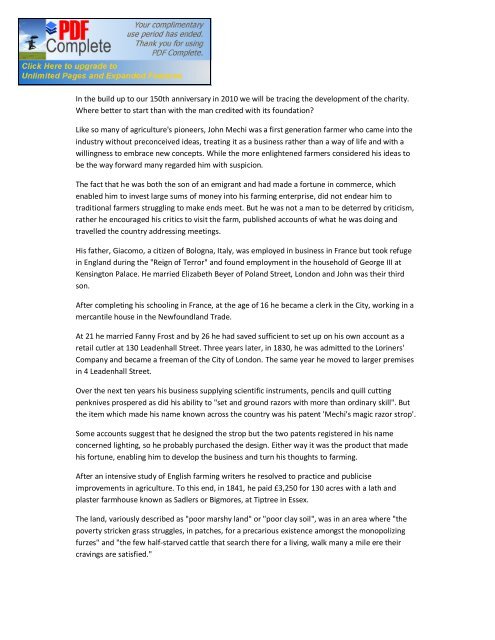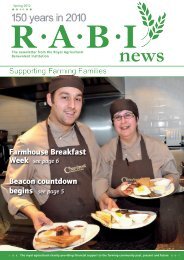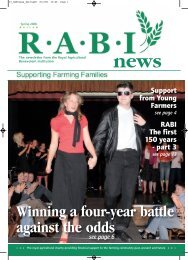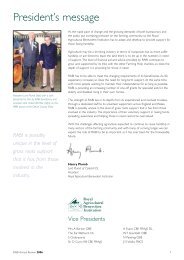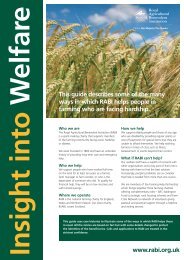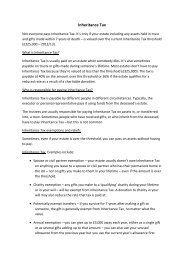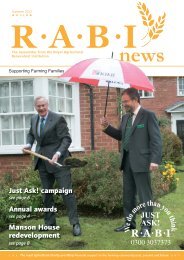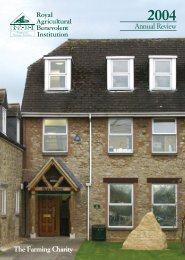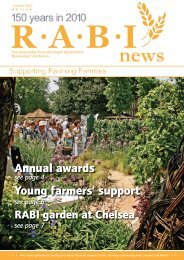The First 150 Years of RABI Part 1 In the build up to our 150th ...
The First 150 Years of RABI Part 1 In the build up to our 150th ...
The First 150 Years of RABI Part 1 In the build up to our 150th ...
Create successful ePaper yourself
Turn your PDF publications into a flip-book with our unique Google optimized e-Paper software.
<strong>The</strong> <strong>First</strong> <strong>150</strong> <strong>Years</strong> <strong>of</strong> <strong>RABI</strong><strong>Part</strong> 1<strong>In</strong> <strong>the</strong> <strong>build</strong> <strong>up</strong> <strong>to</strong> <strong>our</strong> <strong>150</strong>th anniversary in 2010 we will be tracing <strong>the</strong> development <strong>of</strong> <strong>the</strong> charity.Where better <strong>to</strong> start than with <strong>the</strong> man credited with its foundation?Like so many <strong>of</strong> agriculture's pioneers, John Mechi was a first generation farmer who came in<strong>to</strong> <strong>the</strong>industry without preconceived ideas, treating it as a business ra<strong>the</strong>r than a way <strong>of</strong> life and with awillingness <strong>to</strong> embrace new concepts. While <strong>the</strong> more enlightened farmers considered his ideas <strong>to</strong>be <strong>the</strong> way forward many regarded him with suspicion.<strong>The</strong> fact that he was both <strong>the</strong> son <strong>of</strong> an emigrant and had made a fortune in commerce, whichenabled him <strong>to</strong> invest large sums <strong>of</strong> money in<strong>to</strong> his farming enterprise, did not endear him <strong>to</strong>traditional farmers struggling <strong>to</strong> make ends meet. But he was not a man <strong>to</strong> be deterred by criticism,ra<strong>the</strong>r he enc<strong>our</strong>aged his critics <strong>to</strong> visit <strong>the</strong> farm, published accounts <strong>of</strong> what he was doing andtravelled <strong>the</strong> country addressing meetings.His fa<strong>the</strong>r, Giacomo, a citizen <strong>of</strong> Bologna, Italy, was employed in business in France but <strong>to</strong>ok refugein England during <strong>the</strong> "Reign <strong>of</strong> Terror" and found employment in <strong>the</strong> household <strong>of</strong> George III atKensing<strong>to</strong>n Palace. He married Elizabeth Beyer <strong>of</strong> Poland Street, London and John was <strong>the</strong>ir thirdson.After completing his schooling in France, at <strong>the</strong> age <strong>of</strong> 16 he became a clerk in <strong>the</strong> City, working in amercantile house in <strong>the</strong> Newfoundland Trade.At 21 he married Fanny Frost and by 26 he had saved sufficient <strong>to</strong> set <strong>up</strong> on his own account as aretail cutler at 130 Leadenhall Street. Three years later, in 1830, he was admitted <strong>to</strong> <strong>the</strong> Loriners'Company and became a freeman <strong>of</strong> <strong>the</strong> City <strong>of</strong> London. <strong>The</strong> same year he moved <strong>to</strong> larger premisesin 4 Leadenhall Street.Over <strong>the</strong> next ten years his business s<strong>up</strong>plying scientific instruments, pencils and quill cuttingpenknives prospered as did his ability <strong>to</strong> "set and ground razors with more than ordinary skill". But<strong>the</strong> item which made his name known across <strong>the</strong> country was his patent 'Mechi's magic razor strop'.Some accounts suggest that he designed <strong>the</strong> strop but <strong>the</strong> two patents registered in his nameconcerned lighting, so he probably purchased <strong>the</strong> design. Ei<strong>the</strong>r way it was <strong>the</strong> product that madehis fortune, enabling him <strong>to</strong> develop <strong>the</strong> business and turn his thoughts <strong>to</strong> farming.After an intensive study <strong>of</strong> English farming writers he resolved <strong>to</strong> practice and publiciseimprovements in agriculture. To this end, in 1841, he paid £3,250 for 130 acres with a lath andplaster farmhouse known as Sadlers or Bigmores, at Tiptree in Essex.<strong>The</strong> land, variously described as "poor marshy land" or "poor clay soil", was in an area where "<strong>the</strong>poverty stricken grass struggles, in patches, for a precarious existence amongst <strong>the</strong> monopolizingfurzes" and "<strong>the</strong> few half-starved cattle that search <strong>the</strong>re for a living, walk many a mile ere <strong>the</strong>ircravings are satisfied."
Tiptree Hall, EssexHe demolished <strong>the</strong> house, replacing it with a 'modest mansion' - renaming it Tiptree Hall - and addednew farm <strong>build</strong>ings designed according <strong>to</strong> his <strong>the</strong>ories, introducing <strong>the</strong> idea <strong>of</strong> keeping cattle <strong>of</strong>slatted floors. A fur<strong>the</strong>r 42 acres were added <strong>to</strong> <strong>the</strong> farm; old hedges were replaced by newhedgerows, banks and fences; some 300 trees were cut down; and between 80 and 90 miles <strong>of</strong>drainage was laid.<strong>In</strong> <strong>the</strong> first five years he spent over £13,500 creating a model farm, which was <strong>to</strong> attract hundreds <strong>of</strong>visi<strong>to</strong>rs each year <strong>to</strong> demonstrations <strong>of</strong> new machinery, methods and ideas. His "annual Julyagricultural show", which included a speech about his ideas and an ample luncheon, became wellknown. <strong>In</strong> 1852 it was <strong>the</strong> subject <strong>of</strong> a six page report in Charles Dicken's weekly j<strong>our</strong>nal HouseholdWorks; <strong>the</strong> following year it featured in <strong>the</strong> London Illustrated News, which described it as "MrMechi's annual lecture and annual feast"; in 1854 it was reported in <strong>The</strong> Times. By 1856 he wasentertaining some 600 people at his annual ga<strong>the</strong>ring.A constant <strong>the</strong>me <strong>of</strong> John Mechi's speeches was that <strong>the</strong> old ideas and time-hon<strong>our</strong>ed methodswould have <strong>to</strong> be abandoned if farming was <strong>to</strong> be made <strong>to</strong> pay. However, it was many years after hisdeath before his 'meat per acre <strong>the</strong>ories' were accepted and his prediction that ploughing would bedone by machine was 60 years ahead <strong>of</strong> its time.With <strong>the</strong> industrial revolution gaining force, he warned that farm lab<strong>our</strong>ers would have <strong>to</strong> be paidmore and housing conditions improved <strong>to</strong> prevent <strong>the</strong> drift from <strong>the</strong> land. Something which hecertainly practised, housing his own lab<strong>our</strong>ers in neat, red bricked cottages and helping <strong>to</strong> finance<strong>the</strong> <strong>build</strong>ing <strong>of</strong> <strong>the</strong> village school and <strong>the</strong> local church, St Luke's, where he and his second wifeCharlotte are buried.His first wife, Fanny died in 1845, reportedly giving birth <strong>to</strong> a son who "predeceased him" althoughone account <strong>of</strong> John Mechi's life states that his first marriage was childless. <strong>The</strong> same year hisfarming achievements and business acumen were recognised by his appointment as a councilmember <strong>of</strong> <strong>the</strong> Royal Agricultural College, which was going through a difficult period, and he becamea member <strong>of</strong> <strong>the</strong> committee <strong>of</strong> management which was <strong>to</strong> res<strong>to</strong>re <strong>the</strong> college's fortunes.He remarried in 1846, <strong>to</strong> Charlotte Ward <strong>of</strong> Chillesford, Suffolk and between 1850 and 1859 <strong>the</strong>yhad five children - Louisa, Isabella, Joseph, Alice and Florence, only one <strong>of</strong> whom, Louisa appears <strong>to</strong>have married.Meanwhile he maintained his interest in <strong>the</strong> life <strong>of</strong> <strong>the</strong> City. He was both an exhibi<strong>to</strong>r and a juror at<strong>the</strong> Great Exhibition <strong>of</strong> 1851 and, at <strong>the</strong> recommendation <strong>of</strong> Queen Vic<strong>to</strong>ria, a juror at <strong>the</strong> ParisUniversal Exhibition in 1855. <strong>In</strong> 1856 he became a sheriff <strong>of</strong> <strong>the</strong> City <strong>of</strong> London and Middlesex.His commercial business prospered and with <strong>the</strong> purchase <strong>of</strong> ano<strong>the</strong>r cutlery business in 1855 heexpanded in<strong>to</strong> extensive premises in 112 Regent Street. He advertised widely, stating that his s<strong>to</strong>ckincluded <strong>the</strong> "<strong>the</strong> finest specimens <strong>of</strong> British manufactures" in a wide range <strong>of</strong> items includingdressing cases and bagatelles as well as "o<strong>the</strong>r articles <strong>of</strong> utility or luxury suitable for presentation"with a "separate department for papier mache manufactures."
1859 was a busy year for John Mechi. He became alderman for <strong>the</strong> ward <strong>of</strong> Lime Street; hepublished <strong>the</strong> first edition <strong>of</strong> 'How <strong>to</strong> Farm Pr<strong>of</strong>itably' which sold 10,000 copies and had run <strong>to</strong> f<strong>our</strong>editions by 1864; and he <strong>to</strong>ok on a partner, Charles Bazin, restyling <strong>the</strong> business "Mechi & Bazin". <strong>In</strong>1869, after Bazin's death <strong>the</strong> business reverted <strong>to</strong> John Joseph Mechi with an announcement that hewould be "assisted by his son".It was also <strong>the</strong> time when his thoughts turned <strong>to</strong> <strong>the</strong> plight <strong>of</strong> fellow farmers and <strong>the</strong> lack <strong>of</strong> anyorganisation <strong>to</strong> help those who had fallen on hard times, leading <strong>to</strong> <strong>the</strong> formation <strong>of</strong> <strong>the</strong> AgriculturalBenevolent <strong>In</strong>stitution in 1860.John Mechi continued <strong>to</strong> fl<strong>our</strong>ish as a man <strong>of</strong> substance, writing numerous letters about a wholerange <strong>of</strong> subjects, <strong>of</strong>ten having his ideas caricatured in publications such as Punch. He had a ship (<strong>the</strong>SS Tiptree) and a fuchsia (Alderman Mechi) named after him as well as a farm scheme inBlennerhasset, Cumbria. <strong>The</strong> scheme lasted just ten years (1862-72) but Mechi Farm is still <strong>the</strong>re.Between 1860 and 1863 he was master <strong>of</strong> <strong>the</strong> Loriner's Company and by 1866 he was in line <strong>to</strong>become Lord Mayor <strong>of</strong> London.<strong>The</strong>n, reminiscent <strong>of</strong> a Thomas Hardy tragedy, events beyond his control conspired <strong>to</strong> bring abouthis downfall. <strong>The</strong> failure <strong>of</strong> <strong>the</strong> Unity Joint S<strong>to</strong>ck Bank, <strong>of</strong> which he was a governor, and <strong>the</strong> Unity Fireand General Life <strong>In</strong>surance Company, cost him £30,000, but he was proud <strong>of</strong> <strong>the</strong> fact that "his was<strong>the</strong> only bank <strong>to</strong> pay all its credi<strong>to</strong>rs". He felt compelled <strong>to</strong> resign as an alderman and removehimself from <strong>the</strong> running <strong>to</strong> become Lord Mayor.His fortunes were not helped by plummeting sales <strong>of</strong> razor strops, <strong>the</strong> result <strong>of</strong> a vogue for beards,following <strong>the</strong> Crimean War. However, he determinedly pursued his farming activities, becomingchairman <strong>of</strong> <strong>The</strong> Farmers Club in 1877. <strong>The</strong> following year ill health prevented him from working on<strong>the</strong> estate and <strong>the</strong> culmination <strong>of</strong> a succession <strong>of</strong> bad farming years in 1879, when so many farmersfailed, finally brought an end <strong>to</strong> his fortunes.On Boxing Day 1880, just 12 days after having <strong>to</strong> place his affairs in liquidation, John Mechi died <strong>of</strong>diabetes and, it is said, a broken heart.It is a fitting tribute <strong>to</strong> <strong>the</strong> man who gave so much <strong>to</strong> agriculture that in his last months <strong>the</strong> farmers<strong>of</strong> England subscribed £5,000 <strong>to</strong> help out his financial insolvency. He died before he could receive itbut <strong>the</strong> money went <strong>to</strong> his wife and family.<strong>Part</strong> 2Decline in Farming FortunesDuring <strong>the</strong> Napoleonic Wars, with <strong>the</strong> blockading <strong>of</strong> major European ports, food prices soared andfarming prospered. However, by <strong>the</strong> middle <strong>of</strong> <strong>the</strong> 19th century when John Joseph Mechi movedfrom London <strong>to</strong> Tiptree Hall in Essex, <strong>to</strong> become a gentleman farmer, <strong>the</strong>re was a sharp decline infarming fortunes.<strong>The</strong> repeal <strong>of</strong> <strong>the</strong> Corn Laws, <strong>the</strong> arrival <strong>of</strong> cheap grain imports from North America and <strong>the</strong>development <strong>of</strong> refrigerated ships bringing meat from <strong>the</strong> sou<strong>the</strong>rn hemisphere, all resulted in a
considerable reduction in farm incomes. At <strong>the</strong> same time <strong>the</strong> industrial revolution was denuding<strong>the</strong> countryside <strong>of</strong> much <strong>of</strong> its workforce and farmers had <strong>to</strong> leave <strong>the</strong> land uncultivated.Coming from London, where <strong>the</strong> City Guilds s<strong>up</strong>ported those in <strong>the</strong>ir particular trades who fell onhard times, John Mechi was horrified <strong>to</strong> find that <strong>the</strong>re was no one <strong>to</strong> whom farmers could turn intime <strong>of</strong> trouble. Having initially written letters <strong>to</strong> <strong>The</strong> Times he canvassed influential landowners ando<strong>the</strong>rs <strong>to</strong> s<strong>up</strong>port <strong>the</strong> formation <strong>of</strong> a charity <strong>to</strong> help farmers in distress. <strong>The</strong>n, in January 1860, hewrote <strong>the</strong> following letter, appealing <strong>to</strong> farmers across <strong>the</strong> country: -SirI most earnestly beg <strong>to</strong> draw y<strong>our</strong> attention <strong>to</strong> <strong>the</strong> accompanying appeal <strong>to</strong> <strong>the</strong> Landowners andFarmers <strong>of</strong> <strong>the</strong> United Kingdom issued by me end May last – soliciting s<strong>up</strong>port in a cause whichmuch needs it, a fact well confirmed by <strong>the</strong> hearty and sympathizing response I have received from700 Noblemen, Gentlemen, Farmers, Implement Makers and o<strong>the</strong>rs whose names are <strong>the</strong>re<strong>to</strong>subscribed. <strong>The</strong>y saw <strong>the</strong> necessity for such an <strong>In</strong>stitution in this Country. <strong>The</strong>y have given <strong>the</strong>irnames and subscriptions liberally <strong>to</strong> aid its foundation, and now I most earnestly appeal <strong>to</strong> you forassistance in <strong>the</strong> Cause – both as a subscriber and by enlisting <strong>the</strong> s<strong>up</strong>port <strong>of</strong> y<strong>our</strong> friends andneighb<strong>our</strong>s. My object is <strong>to</strong> raise £10,000 in donations and one thousand guineas in annualsubscriptions by <strong>the</strong> time <strong>of</strong> <strong>the</strong> meeting in May next, and <strong>to</strong> do this with as little cost as possible, byavoiding a large staff <strong>of</strong> paid canvassers.I appeal <strong>to</strong> <strong>the</strong> farmers as a body <strong>to</strong> link <strong>the</strong>mselves <strong>to</strong>ge<strong>the</strong>r as volunteer canvassers; no reproachcan attach <strong>to</strong> great energy in advocating a subject <strong>of</strong> such holy import as this. Not pr<strong>of</strong>it but charityis <strong>the</strong> mainspring <strong>of</strong> y<strong>our</strong> efforts and desire <strong>to</strong> help those who are helpless, comfort those who arecomfortless, s<strong>up</strong>port <strong>the</strong> aged, shelter <strong>the</strong> homeless & befriend & instruct <strong>the</strong> innocent andunprotected orphans.I again ask y<strong>our</strong> s<strong>up</strong>port; with zealous and combined efforts I do not fear <strong>the</strong> results.To this date <strong>the</strong> donations amount <strong>to</strong> 1700 guineas & <strong>the</strong> annual subscriptions <strong>to</strong> 410 guineas from450 out <strong>of</strong> <strong>the</strong> 700 founders enrolled.I am sirfaithfully y<strong>our</strong>sJ. J. MechiBirth <strong>of</strong> an <strong>In</strong>stitutionOn 7th February 1860 <strong>the</strong> first council meeting was held at 112 Regent Street, London - <strong>the</strong> west endpremises <strong>of</strong> Mechi & Bazin. Why <strong>the</strong> minutes are headed <strong>the</strong> ‘Royal Agricultural Benevolent College’is unclear - it could have been a slip <strong>of</strong> <strong>the</strong> pen or, with John Mechi’s association with <strong>the</strong> RoyalAgricultural College (he was a member <strong>of</strong> its management committee), he may have had plans <strong>to</strong>link <strong>the</strong> two charities. Minutes <strong>of</strong> subsequent meetings, which are not written in <strong>the</strong> same hand as<strong>the</strong> first one, refer <strong>to</strong> <strong>the</strong> Agricultural Benevolent <strong>In</strong>stitution.
<strong>of</strong> sudden injury or accidental bodily infirmity” resulting in permanent disablement when <strong>the</strong>minimum age was 45, which was <strong>the</strong> same for widows whose husband’s had fulfilled <strong>the</strong>qualifications. <strong>In</strong> <strong>the</strong> case <strong>of</strong> orphans, <strong>the</strong> qualifying time for <strong>the</strong>ir fa<strong>the</strong>r was reduced <strong>to</strong> 10 yearsand <strong>the</strong> minimum age at which <strong>the</strong>y could be admitted was six. <strong>The</strong>y would remain “inmates <strong>of</strong> <strong>the</strong><strong>In</strong>stitution” until <strong>the</strong>y were 14, if <strong>the</strong>y were boys, or 16, if <strong>the</strong>y were girls.Voting for BeneficiariesSelection <strong>of</strong> beneficiaries for a pension was by election, with every donor and subscriber having anumber <strong>of</strong> votes according <strong>to</strong> <strong>the</strong> amount that <strong>the</strong>y had given. An annual subscription <strong>of</strong> half-aguineaentitled <strong>the</strong> subscriber <strong>to</strong> one vote, one guinea bought two votes and <strong>the</strong>n <strong>the</strong> sameproportion <strong>of</strong> votes for every guinea subscribed. A donation <strong>of</strong> five guineas made <strong>the</strong> donor a lifememberentitling <strong>the</strong>m <strong>to</strong> one vote at every election with a fur<strong>the</strong>r vote for every additional fiveguineas. <strong>In</strong> addition, all clergymen preaching on behalf <strong>of</strong> <strong>the</strong> <strong>In</strong>stitution were treated as honorarydonors with voting rights according <strong>the</strong> amount collected from <strong>the</strong>ir congregations.<strong>The</strong> first election for beneficiaries <strong>to</strong>ok place on 2nd May 1861. £455 had been ‘appropriated for <strong>the</strong>maintenance <strong>of</strong> twenty farmers, farmers’ wives, and widows selected from numerous applicants, asmost worthy <strong>of</strong> its earliest bounties’. Nine men, three co<strong>up</strong>les and five widows were chosen <strong>to</strong>receive annual awards <strong>of</strong> £26 for male pensioners, £40 for married co<strong>up</strong>les and £20 widows.<strong>In</strong> subsequent years <strong>the</strong> election was held at <strong>the</strong> annual general meeting in June with <strong>the</strong> number <strong>of</strong>suitable candidates, each recommended by two persons <strong>of</strong> standing in <strong>the</strong> community, alwaysconsiderably exceeding <strong>the</strong> number <strong>of</strong> pensions available. For example, in 1884 <strong>the</strong>re were 377candidates for 64 pensions.<strong>The</strong> number <strong>of</strong> pensions available was a direct reflection <strong>of</strong> <strong>the</strong> level <strong>of</strong> donations until <strong>the</strong><strong>In</strong>stitution started <strong>to</strong> receive legacies which could be invested, enabling it <strong>to</strong> help morepeople. However, <strong>the</strong> annual amounts paid <strong>to</strong> <strong>the</strong> beneficiaries, 10 shillings (50p) a week was <strong>to</strong>remain unchanged for 100 years.<strong>Part</strong> 3<strong>The</strong> Early <strong>Years</strong>To landowners, farmers, and o<strong>the</strong>rs connected with British agriculture.“<strong>The</strong> distinguishing characteristic <strong>of</strong> <strong>our</strong> home charities, as compared with those <strong>of</strong> o<strong>the</strong>r nations, is<strong>the</strong> fact that <strong>the</strong>y rest entirely <strong>up</strong>on private effort. Almost every pr<strong>of</strong>ession, almost every trade, hasits asylums for <strong>the</strong> old, its endowments for <strong>the</strong> widowed, its schools for <strong>the</strong> orphaned – all foundedand maintained by that puissant esprit de corps which forms one <strong>of</strong> <strong>the</strong> most noteworthy socialtraits <strong>of</strong> <strong>the</strong> Anglo-Saxon race. <strong>In</strong> a movement so hon<strong>our</strong>able it seems difficult <strong>to</strong> explain how it isthat <strong>the</strong> Agricultural interest, with its endless ramifications and vast res<strong>our</strong>ces, should haveremained hi<strong>the</strong>r<strong>to</strong> unrepresentative. <strong>The</strong> farmer can turn <strong>to</strong> no refuge from misfortunes, which so<strong>of</strong>ten, in his case above every o<strong>the</strong>r, depend on <strong>the</strong> influences entirely beyond human control. ……Backwardness in works <strong>of</strong> benevolence has, it is true, never been a characteristic <strong>of</strong> <strong>the</strong> agriculturalclasses - <strong>of</strong> no class, probably less! But <strong>the</strong>ir charity has hi<strong>the</strong>r<strong>to</strong> been promiscuous and individual,
while <strong>the</strong> conditions <strong>of</strong> <strong>the</strong> times imposed <strong>up</strong>on it organization and publicity. Let us hasten <strong>to</strong>correct an oversight which may so easily be misrepresented as a reproach. ……Let us, in short, collect in<strong>to</strong> one grand reservoir – organized, imposing and exhaustless – all <strong>the</strong>streams and rivulets <strong>of</strong> private charity – scattered – <strong>of</strong>ten, haply, misapplied – almost alwaysunobserved – through every nook and corner <strong>of</strong> <strong>the</strong> land. Towards this fulfilment <strong>of</strong> this worthyobject, s<strong>up</strong>port has already flowed in from zealous well wishers <strong>of</strong> every grade. His Grace <strong>the</strong> Duke<strong>of</strong> Richmond has accepted <strong>the</strong> post <strong>of</strong> President and among <strong>the</strong> Promoters <strong>of</strong> <strong>the</strong> scheme, nameshon<strong>our</strong>ed by us all will be found in pr<strong>of</strong>usion. That <strong>the</strong>se examples will be eagerly followed, wecannot allow <strong>our</strong>selves <strong>to</strong> doubt, and, in <strong>the</strong> firm conviction that such confidence is well placed.”Extract from <strong>the</strong> foreword by <strong>the</strong> secretary, Charles Shaw, <strong>to</strong> <strong>the</strong> list <strong>of</strong> subscriptions and donationspublished for <strong>the</strong> first annual general meeting <strong>of</strong> <strong>the</strong> Agricultural Benevolent <strong>In</strong>stitution, May 1860.Royal RecognitionJust three years after its foundation <strong>the</strong> Agricultural Benevolent <strong>In</strong>stitution received Queen Vic<strong>to</strong>ria’s<strong>of</strong>ficial nod <strong>of</strong> approval. <strong>The</strong> minutes <strong>of</strong> <strong>the</strong> council meeting held on 5th May 1863 record <strong>the</strong>following letter from Sir Charles Phipps dated Windsor Castle, April 15th 1863.“Sir, - I have had <strong>the</strong> hon<strong>our</strong> <strong>to</strong> submit <strong>to</strong> Her Majesty <strong>The</strong> Queen <strong>the</strong> purport <strong>of</strong> y<strong>our</strong> letter <strong>of</strong> <strong>the</strong>8th inst., as well as <strong>the</strong> spirit <strong>of</strong> <strong>the</strong> Agricultural Benevolent <strong>In</strong>stitution subsequently forwarded <strong>to</strong>me.I have <strong>the</strong> pleasure <strong>to</strong> inform you that Her Majesty has been graciously pleased <strong>to</strong> consent <strong>to</strong>become Patron <strong>of</strong> that <strong>In</strong>stitution.I am fur<strong>the</strong>r commanded <strong>to</strong> notify <strong>to</strong> you <strong>of</strong> Her Majesty’s intention <strong>to</strong> grant an Annual Subscription<strong>of</strong> £25 <strong>to</strong> <strong>the</strong> funds <strong>of</strong> <strong>the</strong> <strong>In</strong>stitution.”After approving <strong>the</strong> secretary’s letter acknowledging ‘<strong>the</strong> hon<strong>our</strong> conferred <strong>up</strong>on <strong>the</strong> <strong>In</strong>stitution’ <strong>the</strong>council passed a resolution ‘that <strong>the</strong> nomination <strong>of</strong> one duly qualified female pensioner, <strong>to</strong> beselected from <strong>the</strong> list candidates, be placed at Her Majesty’s disposal and that such nomination berenewable from time <strong>to</strong> time <strong>up</strong>on <strong>the</strong> death <strong>of</strong> <strong>the</strong> nominee’.From <strong>the</strong>n on <strong>the</strong> prefix Royal was added <strong>to</strong> <strong>the</strong> name <strong>of</strong> <strong>the</strong> charity, as <strong>the</strong> heading for <strong>the</strong> minutes<strong>of</strong> <strong>the</strong> meeting testifies.Establishing Grass Roots ContactsAfter <strong>the</strong> initial surge <strong>of</strong> donations, coming from over 700 individuals spread across <strong>the</strong> country itwas important <strong>to</strong> ensure that contributions continued <strong>to</strong> flow. To this end a network <strong>of</strong> localvoluntary secretaries was established, presumably <strong>to</strong> promote <strong>the</strong> charity, enc<strong>our</strong>age donations andraise subscriptions.<strong>The</strong> annual report for 1864 shows that <strong>the</strong>re were 107 honorary local secretaries covering 30counties. By 1884, <strong>the</strong> number had grown <strong>to</strong> 305 covering 38 counties, <strong>the</strong> largest number being inthose counties, predominantly in <strong>the</strong> east and south <strong>of</strong> England, which had <strong>the</strong> greatest number <strong>of</strong>contribu<strong>to</strong>rs.
With donors and subscribers voting for those who were <strong>to</strong> be selected from <strong>the</strong> vastlyoversubscribed lists <strong>of</strong> candidates, it is not surprising that this bias <strong>to</strong>wards <strong>the</strong> more prosperousfarming areas <strong>of</strong> <strong>the</strong> country was reflected in <strong>the</strong> origins <strong>of</strong> <strong>the</strong> beneficiaries as well as <strong>the</strong>benefac<strong>to</strong>rs.Early Surge <strong>of</strong> ApplicantsAs <strong>RABI</strong> became established and funds were accumulated, <strong>the</strong> number <strong>of</strong> beneficiaries who could beaccepted each year increased but so did <strong>the</strong> number <strong>of</strong> candidates being proposed. <strong>In</strong> 1868 <strong>the</strong>rewere 120 candidates (including 13 married co<strong>up</strong>les) for just 23 places (including three co<strong>up</strong>les). As aresult <strong>the</strong> council meeting held on January 5th 1869 ‘unanimously resolved: That <strong>the</strong> Council shall at<strong>the</strong>ir discretion be empowered on <strong>the</strong> application <strong>of</strong> candidates for relief who have been two yearson <strong>the</strong> books <strong>of</strong> <strong>the</strong> Society, and are not less than eighty years <strong>of</strong> age, <strong>to</strong> give out <strong>of</strong> <strong>the</strong> funds <strong>of</strong> <strong>the</strong><strong>In</strong>stitution a sum not exceeding £10 in any one year.’ Six eligible candidates <strong>the</strong>n receive <strong>the</strong> grant.By 1898 <strong>the</strong> number <strong>of</strong> available places had increased <strong>to</strong> 90 but <strong>the</strong> number <strong>of</strong> candidates was 433,<strong>of</strong> whom 75 were males and 265 females, with 93 married co<strong>up</strong>les. <strong>The</strong> concern caused by thisdisparity between <strong>the</strong> sexes was highlighted by <strong>the</strong> following paragraph in <strong>the</strong> annual reportpresented <strong>to</strong> <strong>the</strong> 1899 annual general meeting: ‘<strong>In</strong> view <strong>of</strong> <strong>the</strong> increasing number <strong>of</strong> FemalePensioners and applications, <strong>to</strong> <strong>the</strong> detriment <strong>of</strong> those <strong>of</strong> <strong>the</strong> Male class, for whose assistance <strong>the</strong><strong>In</strong>stitution was equally, if not primarily, designed, <strong>the</strong> Council, after careful consideration, haveresolved <strong>to</strong> make <strong>the</strong> minimum age <strong>of</strong> admission, on and after January 1st 1900, <strong>the</strong> same for bothsexes, namely 65’.Orphan Children<strong>The</strong> original rules <strong>of</strong> <strong>the</strong> charity state that recipients may include ‘<strong>the</strong> orphan, <strong>of</strong> sex, whose fa<strong>the</strong>rshall have fulfilled <strong>the</strong> (required) conditions for a period <strong>of</strong> ten years, and who is not an imbecile,diseased, or deformed so as <strong>to</strong> impair its growth.‘<strong>The</strong> minimum age <strong>of</strong> submission for children shall be six years, <strong>the</strong> boys admitted remaininginmates <strong>of</strong> <strong>the</strong> <strong>In</strong>stitution until <strong>the</strong>y attain f<strong>our</strong>teen years <strong>of</strong> age, and <strong>the</strong> girls until sixteen years;and no child shall be balloted for after attaining <strong>the</strong> age <strong>of</strong> ten years.’<strong>The</strong> term orphan was defined as being a child who had lost its fa<strong>the</strong>r, ei<strong>the</strong>r by death or incurableinsanity. <strong>The</strong>re were also strict rules about numbers, only one child from <strong>the</strong> same family ‘except<strong>the</strong>re be three dependent children, and both parents dead’ and <strong>the</strong>n not more than two could beadmitted with only one permitted <strong>to</strong> stand on <strong>the</strong> list for selection at any time.When <strong>the</strong> children reached <strong>the</strong> age <strong>of</strong> 14 (boys) or 16 (girls) <strong>the</strong> rules required ‘two respectablehouseholders, approved by <strong>the</strong> council, <strong>to</strong> be responsible for <strong>the</strong>ir removal from <strong>the</strong> <strong>In</strong>stitution’.Alternatively, in <strong>the</strong> case <strong>of</strong> <strong>the</strong> mo<strong>the</strong>r’s remarriage <strong>the</strong>y should be removed earlier.<strong>The</strong> first reference <strong>to</strong> provision for children appears in <strong>the</strong> minutes <strong>of</strong> <strong>the</strong> council meeting held onMay 7th 1867: ‘<strong>The</strong> Secretary having brought before <strong>the</strong> notice <strong>of</strong> <strong>the</strong> meeting <strong>the</strong> important subject<strong>of</strong> providing for <strong>the</strong> maintenance and education <strong>of</strong> farmers’ orphans – <strong>the</strong> Council approved <strong>the</strong>
c<strong>our</strong>se taken by <strong>the</strong> Secretary and directed him <strong>to</strong> write <strong>to</strong> Mr. Pulchete stating that <strong>the</strong> Council hadgiven consideration <strong>to</strong> <strong>the</strong> subject and hoped <strong>to</strong> be able, through <strong>the</strong> means <strong>of</strong> <strong>the</strong> Welsh Charity*,at <strong>the</strong> annual meeting next year <strong>to</strong> elect ten orphan children. <strong>The</strong> Secretary was fur<strong>the</strong>r directed <strong>to</strong>prepare “forms <strong>of</strong> application” for <strong>the</strong> admission <strong>of</strong> children.’Welsh School<strong>The</strong> annual report for 1868 refers <strong>to</strong> <strong>the</strong> ‘maintenance and education <strong>of</strong> Orphan Children, at <strong>the</strong>Welsh Schools at Ashford, Middlesex,' as forming an interesting and important feature.On April 6th 1869 five members <strong>of</strong> <strong>the</strong> council (including John Mechi) <strong>to</strong>ge<strong>the</strong>r with <strong>the</strong> secretary,Charles Shaw, paid an <strong>of</strong>ficial visit <strong>to</strong> <strong>the</strong> school. <strong>The</strong>re followed a glowing report on <strong>the</strong>establishment in <strong>the</strong> minutes <strong>of</strong> <strong>the</strong> council meeting held on May 4th 1869: ‘<strong>The</strong> members <strong>of</strong> <strong>the</strong>Council communicated individually with <strong>the</strong>se children and have great satisfaction in reportingfav<strong>our</strong>ably <strong>of</strong> <strong>the</strong> careful treatment <strong>the</strong>y appear <strong>to</strong> receive, as indicated by <strong>the</strong>ir healthy cheerfuland cleanly appearance.<strong>The</strong>y are receiving suitable instruction <strong>to</strong> fit <strong>the</strong>m for practical occ<strong>up</strong>ations in after life, and <strong>the</strong>moral and religious training <strong>of</strong> <strong>the</strong> establishment was not less satisfac<strong>to</strong>ry <strong>to</strong> <strong>the</strong> members <strong>of</strong>Council. <strong>The</strong> dietary (sic) was also enquired in<strong>to</strong> and found <strong>to</strong> be good plain and substantial. <strong>The</strong>school and internal play rooms are capacious and airy and <strong>the</strong> dormi<strong>to</strong>ries (sic) high in <strong>the</strong> ceilingsand well ventilated, indeed s<strong>up</strong>erior <strong>to</strong> <strong>the</strong> generality <strong>of</strong> sleeping rooms in ordinary houses. <strong>The</strong><strong>build</strong>ings stand <strong>up</strong>on a dry gravely soil and <strong>the</strong> playgrounds afford full scope for all kinds <strong>of</strong> gamesand exercise.‘Under <strong>the</strong>se circumstances <strong>the</strong> Council think that <strong>the</strong>y are most fortunate in being able <strong>to</strong> secure<strong>the</strong> advantages this establishment affords at such moderate terms and <strong>the</strong>y wish <strong>to</strong> send <strong>the</strong>ir highopinion <strong>of</strong> <strong>the</strong> Head Master Mr. Davies and <strong>the</strong>ir obligation <strong>to</strong> <strong>the</strong> Direc<strong>to</strong>rs’.<strong>The</strong> ‘moderate terms’ were £15 for girls and £17 for boys which were increased <strong>to</strong> £18 and £20respectively in May 1873, when <strong>the</strong> secretary was directed <strong>to</strong> ‘convey <strong>to</strong> <strong>the</strong> Committee <strong>of</strong> <strong>the</strong>Welsh Charity <strong>the</strong> best thanks <strong>of</strong> <strong>the</strong> Council for <strong>the</strong> care and attention bes<strong>to</strong>wed <strong>up</strong>on <strong>the</strong> Childrenplaced in <strong>the</strong> establishment.’However, it appears that not everyone was quite so happy with conditions at <strong>the</strong> school. Later in1873 <strong>the</strong> council received two letters <strong>of</strong> complaint about <strong>the</strong> standard <strong>of</strong> <strong>the</strong> food. <strong>The</strong>se wereconsidered at <strong>the</strong> January 1874 council meeting ‘<strong>to</strong>ge<strong>the</strong>r with a communication in reply <strong>to</strong> <strong>the</strong>Secretary from <strong>the</strong> Matron <strong>of</strong> <strong>the</strong> Establishment’. <strong>The</strong> minutes record that ‘<strong>the</strong> Council <strong>up</strong>on carefulconsideration <strong>of</strong> <strong>the</strong> whole matter were unanimously <strong>of</strong> opinion that <strong>the</strong> complaints weresufficiently unimportant <strong>to</strong> warrant <strong>the</strong>ir taking no <strong>of</strong>ficial means <strong>to</strong> bring <strong>the</strong>m before <strong>the</strong> notice <strong>of</strong><strong>the</strong> governors <strong>of</strong> <strong>the</strong> Welsh Charity.’One <strong>of</strong> <strong>the</strong> orphans, John <strong>In</strong>ckle (also recorded as <strong>In</strong>chle) who was taken on in 1870 at <strong>the</strong> age <strong>of</strong>nine, had <strong>the</strong> distinction <strong>of</strong> receiving a donation <strong>of</strong> £5 from <strong>the</strong> council in June 1877 ‘for exceptionalgood conduct during his scholastic career as testified by <strong>the</strong> Master in a special report <strong>to</strong> <strong>the</strong>Council’.
However, by March 1879 <strong>the</strong> need <strong>to</strong> concentrate res<strong>our</strong>ces on meeting <strong>the</strong> growing number <strong>of</strong>adult applications resulted in a decision by council ‘that no more children be admitted after <strong>the</strong> nextelection’. <strong>In</strong>terestingly <strong>the</strong>re was also a resolution at <strong>the</strong> same meeting that ‘<strong>the</strong> Annual Dinner besuspended in view <strong>of</strong> <strong>the</strong> charge it entails <strong>up</strong>on <strong>the</strong> funds <strong>of</strong> <strong>the</strong> Society’ but this was defeated bynine votes <strong>to</strong> two!<strong>The</strong> intake <strong>of</strong> <strong>RABI</strong> orphans, 99 in <strong>to</strong>tal, <strong>to</strong> <strong>the</strong> Welsh School had lasted just 12 years, although thatwas not quite <strong>the</strong> end <strong>of</strong> <strong>the</strong> matter. Correspondence from a Mr. Scott Burns concerning <strong>the</strong>admission <strong>of</strong> children is mentioned in <strong>the</strong> minutes <strong>of</strong> <strong>the</strong> Oc<strong>to</strong>ber 1881 council meeting, althoughwhat he said is not recorded. <strong>The</strong> secretary was instructed ‘<strong>to</strong> thank that gentleman for <strong>the</strong> interes<strong>the</strong> expresses in <strong>the</strong> General welfare <strong>of</strong> <strong>the</strong> <strong>In</strong>stitution but <strong>to</strong> state that at <strong>the</strong> same time <strong>the</strong>y wereunanimously <strong>of</strong> <strong>the</strong> opinion that his views could not be entertained, with any practical advantage <strong>to</strong><strong>the</strong> objects <strong>of</strong> <strong>the</strong> <strong>In</strong>stitution’.*<strong>The</strong> Welsh Charity administered <strong>the</strong> Welsh School, which had started as <strong>the</strong> British Charity Schoolin London where it was established in 1718 by <strong>the</strong> Society <strong>of</strong> Ancient Bri<strong>to</strong>ns. <strong>The</strong> institution wass<strong>up</strong>ported by voluntary contributions. It moved <strong>to</strong> Ashford in 1857 and in 1882, it became a singlesexschool, renamed <strong>the</strong> Welsh Girls School. It is now named St David's School.Some <strong>of</strong> those who were helped in <strong>the</strong> early years and <strong>the</strong> reasons why <strong>the</strong>y were in need.<strong>In</strong> <strong>the</strong> early years <strong>the</strong> names <strong>of</strong> <strong>the</strong> pensioners, <strong>to</strong>ge<strong>the</strong>r with <strong>the</strong>ir background details and <strong>the</strong>reason for <strong>the</strong>ir application, were published with <strong>the</strong> annual list <strong>of</strong> subscribers and donors. <strong>The</strong>seprovide an interesting insight in<strong>to</strong> <strong>the</strong> problems that faced many farmers in <strong>the</strong> 1860s and 70s,mostly as a result <strong>of</strong> <strong>the</strong> downturn in farming fortunes following <strong>the</strong> end <strong>of</strong> <strong>the</strong> Napoleonic War foodblockades and <strong>the</strong> repeal <strong>of</strong> <strong>the</strong> Corn Laws.Thomas and Sarah Tilbury aged 84 and 73. Farmed 220 acres for twenty-eight years, in Sussex, at arental <strong>of</strong> £210 per annum.“Losses by <strong>the</strong> low price <strong>of</strong> corn in 1823; heavy losses in s<strong>to</strong>ck; and great expenses from long illnessin his family, <strong>the</strong> children being very sickly.”Charlotte Mason aged 62. Husband farmed 250 acres for forty years, in Buckinghamshire, at a rental<strong>of</strong> £265 per annum.“Misplaced confidence in <strong>the</strong> family solici<strong>to</strong>r.”Mary Way aged 74. Husband farmed 730 acres for twenty-one years, in Hampshire, at a rental <strong>of</strong>£760 per annum.“High rental and buying s<strong>to</strong>ck in a very high year, succeeded by low and ruinous prices in agriculturalproduce.”Jonathan Smallbones. Farmed 184 acres for twenty-one years, in Wiltshire, at a rental <strong>of</strong> £250 perannum.
“Wife afflicted for twenty-f<strong>our</strong> years, and losses through relatives and friends.”Charlotte Smith aged 69. Husband farmed 946 acres for many years, in Sussex; also 300 acres inKent, at an estimated rental <strong>of</strong> £3,500 per annum.“Depreciation in <strong>the</strong> value <strong>of</strong> hops, and incapacity <strong>of</strong> <strong>the</strong> husband for business through paralysis <strong>of</strong><strong>the</strong> brain.”William Stanford aged 66. Farmed 570 acres for twenty-nine years, in Wiltshire, at a rental <strong>of</strong> £500per annum.“1317 sheep died from <strong>the</strong> ‘rot’ in 1834 and 1835. <strong>In</strong> 1836, July 5th, all crops destroyed by ahails<strong>to</strong>rm.”Sarah Ovens aged 69. Husband farmed 365 acres for twenty-six years, in Northamp<strong>to</strong>nshire, at arental <strong>of</strong> £600 per annum.“Free trade, sale <strong>of</strong> s<strong>to</strong>ck, &c., for benefits <strong>of</strong> credi<strong>to</strong>rs, 1850.”John Cory aged 58*. Farmed 450 acres for thirty years, in Warwickshire, at a rental <strong>of</strong> £740 perannum.“Being a bondsman for friends and ill health.”*exempt from limit as <strong>to</strong> age in consequence <strong>of</strong>chronic rheumatism.Edmund Painter aged 78. Farmed 500 acres for many years, in Oxfordshire, at a rental <strong>of</strong> £360 perannum.“Unfortunate circumstances and misplaced confidence.”Mary Anne Bol<strong>to</strong>n aged 78. Husband farmed 100 acres for thirty-f<strong>our</strong> years, in Suffolk, at a rental <strong>of</strong>£140 per annum.“Husband having a large family, and much sickness and bad times <strong>to</strong> contend against, leavingapplicant <strong>to</strong>tally unprovided for.”Millicent Mott aged 64. Fa<strong>the</strong>r farmed 372 acres for fifty years in Essex.“Farm sold and quitted at great loss; since unsuccessfully engaged.”Mary Grundy aged 72. Husband farmed 360 acres for thirty-six years, in Staffordshire, at a rental <strong>of</strong>£602 per annum.“Diseases in cattle, and losses by rendering himself liable for debts <strong>of</strong> his bro<strong>the</strong>r.”
<strong>Part</strong> 4End <strong>of</strong> an Era: Beginning <strong>of</strong> a Century<strong>The</strong> years 1880 <strong>to</strong> 1910, and <strong>the</strong> completion <strong>of</strong> <strong>RABI</strong>’s first 50 years, was a period <strong>of</strong> significantchange and enormous technological development in Britain. Schooling became compulsory; timewas standardised by <strong>the</strong> adoption <strong>of</strong> GMT; agricultural workers (men that is) were given <strong>the</strong> vote;old age pensions were introduced; both Queen Vic<strong>to</strong>ria, after celebrating her Golden Jubilee, andKing Edward VII died; <strong>the</strong> Lab<strong>our</strong> party, <strong>the</strong> Suffragette movement and Sinn Fein were all foundedand <strong>the</strong>re was a plethora <strong>of</strong> technological firsts, ranging from radio transmission and air flights <strong>to</strong> zipfasteners and paper clips.It was also a time <strong>of</strong> change for <strong>RABI</strong>. At <strong>the</strong> beginning <strong>of</strong> 1880 <strong>the</strong> charity’s founder, John Mechi,seconded a proposal, which was unanimously agreed at <strong>the</strong> February council meeting, “that anymember <strong>of</strong> <strong>the</strong> council on compounding with his credi<strong>to</strong>rs shall be disqualified from retaining hisseat on <strong>the</strong> Council Board”. Ten months later, <strong>the</strong> following letter, addressed <strong>to</strong> <strong>the</strong> secretaryCharles Shaw, was read <strong>to</strong> <strong>the</strong> December council meeting:“Dear Shaw,Owing <strong>to</strong> my advanced age, declining health and financial difficulties I have determined on resigningmy seat at <strong>our</strong> Council and also withdrawing my name as a Trustee <strong>to</strong> <strong>the</strong> royal Ag. Bent. <strong>In</strong>stn. <strong>In</strong>doing so please assure my bro<strong>the</strong>r Councilmen that my exertions on behalf <strong>of</strong> <strong>the</strong> Charity willcontinue and that I shall always look back with pleasure on <strong>our</strong> social interc<strong>our</strong>se in connection with<strong>the</strong> charity.Dear ShawThine trulyJ.J. Mechi”.<strong>The</strong> secretary was ‘instructed <strong>to</strong> reply on <strong>the</strong> most sympa<strong>the</strong>tic terms.’ Within five days <strong>of</strong> <strong>the</strong>meeting on 9th December his affairs had been placed in <strong>the</strong> hands <strong>of</strong> <strong>the</strong> liquida<strong>to</strong>r and he died onBoxing Day, not <strong>of</strong> diabetes, as previously recorded but, according <strong>to</strong> his death certificate, ‘phrenitis,gastritis, exhaustion’.Tribute <strong>to</strong> a Worthy Founder<strong>The</strong> minutes <strong>of</strong> <strong>the</strong> next council meeting, on 4th January 1881, record:“That this being <strong>the</strong> first meeting <strong>of</strong> <strong>the</strong> Council since <strong>the</strong> lamented death <strong>of</strong> Mr John Joseph Mechi<strong>the</strong> secretary be instructed <strong>to</strong> convey <strong>to</strong> Mrs Mechi and family <strong>the</strong>ir unfeigned regret at <strong>the</strong> loss <strong>the</strong>yhave sustained by <strong>the</strong> decease <strong>of</strong> <strong>the</strong>ir much valued friend and coadju<strong>to</strong>r Mr Mechi. <strong>In</strong> <strong>the</strong>irsevere bereavement <strong>the</strong> Council desire <strong>to</strong> assure Mrs Mechi and her family <strong>of</strong> <strong>the</strong>ir sincere andheartfelt condolences.” It was unanimously agreed <strong>the</strong> secretary prepare a framed address, <strong>to</strong> be‘engraved on vellum and presented <strong>to</strong> Mrs Mechi’.
It was also recorded that <strong>the</strong>re would be a proposal at <strong>the</strong> next meeting for “an annuity be granted<strong>to</strong> Mrs Mechi out <strong>of</strong> <strong>the</strong> funds <strong>of</strong> <strong>the</strong> <strong>In</strong>stitution”. However, events seem <strong>to</strong> have overtaken thisproposal as within days <strong>of</strong> <strong>the</strong> meeting a national ‘Mechi Fund’, had been established.Championed by a number <strong>of</strong> MPs <strong>the</strong> fund was chaired by <strong>the</strong> Marquis <strong>of</strong> Huntly and its committeeincluded <strong>the</strong> Duke <strong>of</strong> Bedford, <strong>the</strong> Earl <strong>of</strong> Leicester, Lord Carring<strong>to</strong>n and many o<strong>the</strong>r men <strong>of</strong> wealthand influence.As a result, at <strong>the</strong> February meeting <strong>the</strong> proposal was postponed “until <strong>the</strong> <strong>to</strong>tal sum resulting from<strong>the</strong> Mechi Fund should be ascertained.” At that stage, with £4,000 already, <strong>the</strong> Prime MinisterWilliam Glads<strong>to</strong>ne, at <strong>the</strong> request <strong>of</strong> Samuel Morley MP, granted a donation <strong>of</strong> £200 from <strong>the</strong>Royal Bounty. It was agreed <strong>to</strong> close <strong>the</strong> fund at £5,000 (equivalent <strong>to</strong> about £500,000 in currentvalues) - an overwhelming acknowledgment <strong>of</strong> <strong>the</strong> respect in which John Mechi was held.<strong>In</strong> April <strong>the</strong> deaths are also recorded <strong>of</strong> Charles Cantrell (who had chaired <strong>the</strong> council for <strong>the</strong> past 29years) and Thomas Scott (<strong>the</strong> original deputy-chairman), who had both served on <strong>the</strong> council sinceits formation. Subsequently, at <strong>the</strong> May meeting, it was unanimously agreed: “That <strong>the</strong> AnnualDinner <strong>of</strong> <strong>the</strong> Society should be abandoned for <strong>the</strong> present year in consequence <strong>of</strong> <strong>the</strong> death <strong>of</strong> <strong>the</strong>Founder and <strong>of</strong> o<strong>the</strong>r influential members <strong>of</strong> <strong>the</strong> Society.”Cattle Plague DonationDuring this time <strong>the</strong>re was also a long-running correspondence with <strong>the</strong> Norfolk Cattle PlagueAssociation. <strong>The</strong> members <strong>of</strong> <strong>the</strong> association, having decided that <strong>the</strong>re was now little likelihood <strong>of</strong><strong>the</strong>ir remaining funds (about £6,000) being required for <strong>the</strong> original object <strong>of</strong> <strong>the</strong> association,wanted <strong>to</strong> give two-thirds <strong>of</strong> <strong>the</strong> amount <strong>to</strong> <strong>RABI</strong>.<strong>The</strong> <strong>RABI</strong> council had agreed that it would permanently invest <strong>the</strong> one and use <strong>the</strong> incomeexclusively for <strong>the</strong> relief <strong>of</strong> Norfolk farmers, with a stipulation that should any legal proceedings betaken against <strong>the</strong> Association for breach <strong>of</strong> trust <strong>the</strong> money, or investments, would be returned.However, <strong>the</strong> agreement ran in<strong>to</strong> legal obstacles and after several months <strong>of</strong> procrastination it wasfinally resolved that <strong>the</strong> money be invested by <strong>the</strong> Norfolk Cattle Plague Association with <strong>the</strong>interest paid <strong>to</strong> <strong>RABI</strong>.<strong>The</strong> council agreed that <strong>the</strong> income from <strong>the</strong> fund would be used <strong>to</strong> ‘maintain one married co<strong>up</strong>le,one male and two females’. <strong>In</strong> return all present members <strong>of</strong> <strong>the</strong> Association were each granted avote, for <strong>the</strong> period <strong>of</strong> <strong>the</strong>ir life, in <strong>the</strong> annual ballot for <strong>the</strong> selection <strong>of</strong> pensioners.Balloting for PensionersBy present standards <strong>the</strong> system <strong>of</strong> selecting pensioners by an annual vote may now seemsomewhat archaic. But with <strong>the</strong> number <strong>of</strong> qualifying applicants far exceeding that which could beaccepted, this method <strong>of</strong> selection with <strong>the</strong> results being available for public scrutiny was considered<strong>the</strong> most acceptable.
However, <strong>the</strong> allocation <strong>of</strong> votes, based on how much a subscriber donated, could enable wealthydonors undue influence in <strong>the</strong> selection <strong>of</strong> pensioners. Large donations could also result in votingrights being granted for a considerable number <strong>of</strong> years with <strong>the</strong> rights passing on <strong>to</strong> heirs orexecu<strong>to</strong>rs.For example, in 1885 Miss Emma Goodman <strong>of</strong> 68 Tavis<strong>to</strong>ck Street, Bedford left £1,500, whichequated <strong>to</strong> 228 votes (for 60 years) <strong>to</strong> be administered equally by f<strong>our</strong> trustees (72 each) and “on<strong>the</strong> death <strong>of</strong> any one <strong>of</strong> <strong>the</strong> Trustees his or her votes <strong>to</strong> be divided among <strong>the</strong> survivors”. When <strong>the</strong>last surviving trustee died, in April 1930, <strong>the</strong> 228 votes passed <strong>to</strong> <strong>the</strong> Bedfordshire AgriculturalSociety “until 1944 inclusive”.<strong>In</strong> 1882 <strong>the</strong> council agreed a rule “that Firms, Companies, and Corporate Bodies making Donations <strong>to</strong><strong>the</strong> <strong>In</strong>stitution shall receive Votes at <strong>the</strong> rate <strong>of</strong> One for every Five Guineas, such Votes being vestedin a Trustee or Trustees, <strong>to</strong> be appointed at <strong>the</strong> time <strong>the</strong> Donation is made, and <strong>to</strong> cease on <strong>the</strong>death <strong>of</strong> <strong>the</strong> same or surviving Trustee; but in no case shall <strong>the</strong> number <strong>of</strong> trustees appointedexceed <strong>the</strong> sums <strong>of</strong> Five Guineas so paid.”This enc<strong>our</strong>aged donations from numerous organisations such as local farmers’ clubs, agriculturalassociations and hunts that held votes for varying lengths <strong>of</strong> time. Not all <strong>of</strong> <strong>the</strong>m had an obviousconnection with agriculture. For example, in 1897, <strong>the</strong> Tring Association for <strong>the</strong> Prosecution <strong>of</strong>Felons donated £5 5s 0d and held one vote for 50 years. <strong>The</strong> records also list 73 vicars and o<strong>the</strong>rswho had life votes standing in <strong>the</strong>ir names, as a result <strong>of</strong> church collections, and among <strong>the</strong>execu<strong>to</strong>rs “administering deceased’s' votes” <strong>the</strong> Westminster, Barclays, Lloyds and NationalProvincial banks, as well as <strong>the</strong> Public Trustees Office, all held a considerable number <strong>of</strong> votes whichwere not due <strong>to</strong> expire until 1962 <strong>to</strong> 1966.Death <strong>of</strong> Vic<strong>to</strong>ria<strong>The</strong> minutes <strong>of</strong> <strong>the</strong> February 1901 council meeting carry <strong>the</strong> text <strong>of</strong> a very fulsome address <strong>to</strong> “<strong>The</strong>King’s Most Excellent Majesty” expressing <strong>the</strong> council’s condolences on <strong>the</strong> death <strong>of</strong> Queen Vic<strong>to</strong>riaand welcoming King Edward VII <strong>to</strong> <strong>the</strong> throne. At <strong>the</strong> May meeting <strong>the</strong> secretary read a letter from<strong>the</strong> Keeper <strong>of</strong> <strong>the</strong> King’s Purse, Sir Digh<strong>to</strong>n Probyn, confirming that <strong>the</strong> King was “pleased <strong>to</strong> accede<strong>to</strong> <strong>the</strong> request that he should become Patron.”<strong>In</strong> August 1901 <strong>the</strong> Archbishop <strong>of</strong> Canterbury voiced his s<strong>up</strong>port <strong>of</strong> <strong>RABI</strong>. <strong>In</strong> a letter read <strong>to</strong> <strong>the</strong>council, he said that having “inquired in <strong>to</strong> <strong>the</strong> work” <strong>of</strong> <strong>RABI</strong> he was “quite satisfied that it is <strong>of</strong> greatvalue”. He added that <strong>the</strong> need for it “in <strong>the</strong> present state <strong>of</strong> agriculture is undeniable and <strong>the</strong> modein which an endeav<strong>our</strong> is made <strong>to</strong> meet that need appears <strong>to</strong> me <strong>to</strong> be sound in every way.” Hedeclared his s<strong>up</strong>port for <strong>the</strong> donation <strong>of</strong> harvest festival collections <strong>to</strong> <strong>the</strong> charity andenc<strong>our</strong>agement for “clergy who are deeply interested in <strong>the</strong> agriculture <strong>of</strong> this country” <strong>to</strong> find o<strong>the</strong>rmodes <strong>of</strong> s<strong>up</strong>porting <strong>RABI</strong>.By 1909 two <strong>to</strong>pics dominated <strong>the</strong> council discussions – <strong>the</strong> affects <strong>of</strong> <strong>the</strong> government’s proposedintroduction <strong>of</strong> an old age pension scheme and a celebration <strong>to</strong> mark <strong>RABI</strong>’s 50th anniversary.
Pensions ActDavid Lloyd George, <strong>the</strong> chancellor <strong>of</strong> <strong>the</strong> exchequer in Asquith’s Liberal government wasdetermined <strong>to</strong> take action <strong>to</strong> "lift <strong>the</strong> shadow <strong>of</strong> <strong>the</strong> workhouse from <strong>the</strong> homes <strong>of</strong> <strong>the</strong> poor". Hebelieved <strong>the</strong> best way <strong>of</strong> doing this was <strong>to</strong> guarantee an income <strong>to</strong> people who were <strong>to</strong>o old <strong>to</strong> workand in 1908 he introduced <strong>the</strong> Old Age Pensions Act <strong>to</strong> provide between 1s. and 5s. a week <strong>to</strong>people over seventy on incomes not exceeding 12s. a week.<strong>The</strong> council set <strong>up</strong> a sub committee <strong>to</strong> study <strong>the</strong> effect that such a pension scheme might have on<strong>RABI</strong> funds and its pensioners and, as result <strong>of</strong> its deliberations, <strong>the</strong> following statement was madeat <strong>the</strong> AGM in June 1909. “With a view <strong>to</strong> preventing <strong>the</strong>ir funds – which are entirely voluntary –from being used in <strong>the</strong> relief <strong>of</strong> State obligations, <strong>the</strong> Council have resolved that <strong>the</strong> pensions <strong>of</strong>persons who are over 70 years <strong>of</strong> age shall be reduced by such a sum as will enable <strong>the</strong>m <strong>to</strong> applyfor <strong>the</strong> Government Old Age Pension <strong>of</strong> <strong>the</strong> largest amount, provided such a reduction does notinvolve <strong>the</strong>ir Pensioners in any pecuniary loss. Any saving thus effected will enable <strong>the</strong> Council <strong>to</strong>increase <strong>the</strong> number <strong>of</strong> <strong>the</strong>ir annuitants.”However, it was not <strong>to</strong> prove <strong>to</strong> be a straightforward operation as <strong>the</strong> audi<strong>to</strong>rs (Messrs Deloitte)pointed out <strong>to</strong> <strong>the</strong> Oc<strong>to</strong>ber 1909 council meeting. Because, unlike <strong>the</strong> government’s old age pensionscheme, <strong>RABI</strong> did not pay <strong>the</strong> same rate <strong>to</strong> men as <strong>to</strong> women <strong>the</strong> calculations would be different and<strong>the</strong> charity “must entertain <strong>the</strong> keeping <strong>of</strong> an entirely fresh set <strong>of</strong> books and additional <strong>of</strong>fice staff aswell as more lengthy and careful audit <strong>of</strong> <strong>the</strong> accounts.”At <strong>the</strong> same time <strong>the</strong> audi<strong>to</strong>rs estimated that <strong>the</strong> savings should be not less than £1,000 a year “if<strong>the</strong> revision <strong>of</strong> pensions was carried out with care and accuracy.” <strong>In</strong> fact <strong>the</strong> secretary reported <strong>to</strong><strong>the</strong> December meeting that “a saving <strong>of</strong> £1,500 per annum would probably be effected”.Dinner That Never WasAs early as June 1908 <strong>the</strong> <strong>RABI</strong> chairman, <strong>The</strong> Earl <strong>of</strong> Jersey, was approaching <strong>the</strong> Prince <strong>of</strong> Wales <strong>to</strong>seek his consent <strong>to</strong> preside at a Jubilee Dinner in 1910. Not surprisingly, <strong>the</strong> prince was “disinclined<strong>to</strong> make any definite arrangements for an event separated from us by so long an interval <strong>of</strong> time”,and <strong>to</strong>ld him <strong>to</strong> come back nearer <strong>the</strong> time. During 1909 <strong>the</strong>re are indications that some members <strong>of</strong>council were concerned that a date for <strong>the</strong> dinner could not be fixed until <strong>the</strong>y had received aresponse from <strong>the</strong> Prince. This was resolved by his acceptance at <strong>the</strong> beginning <strong>of</strong> 1910 and at <strong>the</strong>council meeting on 2nd May it was reported that “<strong>the</strong> Prince <strong>of</strong> Wales had expressed his personalapproval <strong>of</strong> <strong>the</strong> arrangements made for <strong>the</strong> Jubilee Dinner on <strong>the</strong> 10th inst, and that <strong>the</strong>acceptances <strong>up</strong> <strong>to</strong> date amounted <strong>to</strong> 370”.On 6th May, just f<strong>our</strong> days before <strong>the</strong> dinner, King Edward died. As it is recorded in <strong>the</strong> proceedings<strong>of</strong> <strong>the</strong> 50th annual general meeting on 8th <strong>of</strong> June: “<strong>The</strong> arrangements that had been made forcelebrating <strong>the</strong> jubilee <strong>of</strong> <strong>the</strong> <strong>In</strong>stitution by a public dinner, at which <strong>the</strong> present Kinghad graciously consented <strong>to</strong> preside, were in consequence <strong>of</strong> <strong>the</strong> national affliction immediatelycancelled.” <strong>The</strong> report continues <strong>to</strong> say that <strong>the</strong> jubilee fund, which would remain open until <strong>the</strong> end<strong>of</strong> <strong>the</strong> year had already reached a <strong>to</strong>tal <strong>of</strong> £5,000.
<strong>In</strong> an attempt <strong>to</strong> salvage some sort <strong>of</strong> celebration <strong>of</strong> <strong>the</strong> anniversary it was decided <strong>to</strong> hold <strong>the</strong>postponed jubilee dinner in December, during 'cattle show week' (<strong>the</strong> forerunner <strong>to</strong> <strong>the</strong> SmithfieldShow), and <strong>the</strong> Duke <strong>of</strong> Portland who had expressed a willingness <strong>to</strong> attend, was invited <strong>to</strong>preside. Unfortunately <strong>the</strong> Duke was unable <strong>to</strong> attend during December and he suggested that <strong>the</strong>dinner should be postponed "until <strong>the</strong> present Prince <strong>of</strong> Wales becomes <strong>of</strong> age <strong>to</strong> take part in publicaffairs when he would be glad <strong>to</strong> find out if His Royal Highness will hon<strong>our</strong> <strong>the</strong> Society by presiding."As a result, on <strong>the</strong> recommendation <strong>of</strong> <strong>the</strong> dinner committee, <strong>the</strong> council decided <strong>to</strong> 'relinquish' <strong>the</strong>dinner and what had been hoped <strong>to</strong> be a year <strong>of</strong> celebration ended on a ra<strong>the</strong>r low note.


